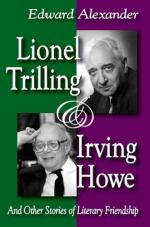|
This section contains 1,529 words (approx. 6 pages at 300 words per page) |

|
SOURCE: "Remembering Irving Howe (1920–93)," in The New York Times Book Review, May 23, 1993, p. 31.
A friend of Howe's for many years, Wieseltier is the literary editor of The New Republic. In the following essay, he discusses Howe's views on politics, literature, and Judaism.
It was a moody September morning in 1991, and we were walking down Madison Avenue, gossiping about books, when Irving Howe changed the subject. "Something happened to me in Paris that you might understand" was how he began the least likely conversation we ever had. "I was in the garden at the Rodin Museum. For a few minutes I was alone, sitting on a stone bench between two long hedges of roses. Pink roses. Suddenly I felt the most powerful feeling of peace, and I had the thought that death, if it means an absorption into a reality like the one that was before me, might be...
|
This section contains 1,529 words (approx. 6 pages at 300 words per page) |

|


